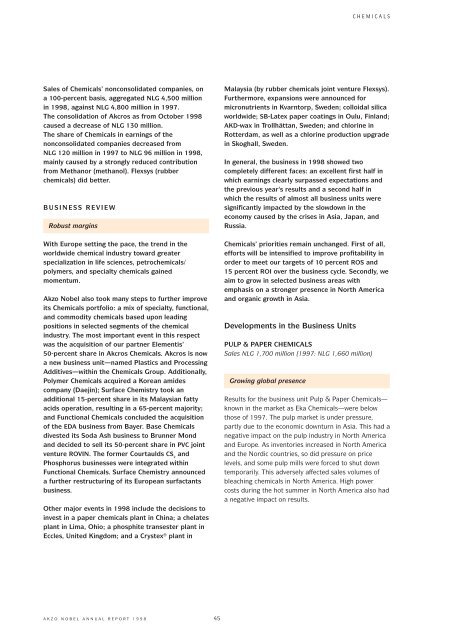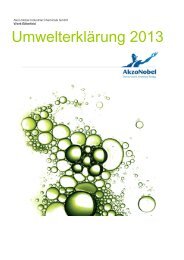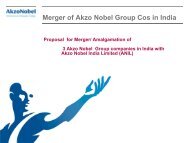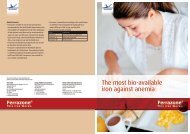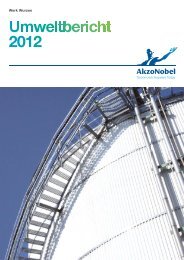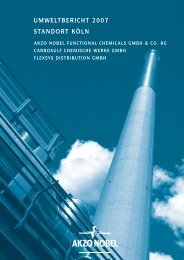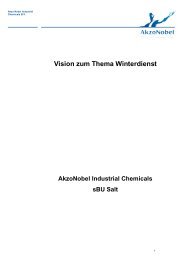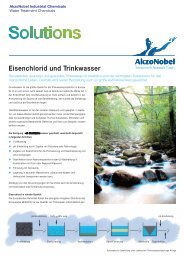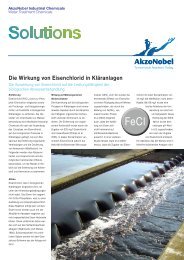Create successful ePaper yourself
Turn your PDF publications into a flip-book with our unique Google optimized e-Paper software.
Sales of Chemicals’ nonconsolidated companies, on<br />
a 100-percent basis, aggregated NLG 4,500 million<br />
in 1998, against NLG 4,800 million in 1997.<br />
The consolidation of Akcros as from October 1998<br />
caused a decrease of NLG 130 million.<br />
The share of Chemicals in earnings of the<br />
nonconsolidated companies decreased from<br />
NLG 120 million in 1997 to NLG 96 million in 1998,<br />
mainly caused by a strongly reduced contribution<br />
from Methanor (methanol). Flexsys (rubber<br />
chemicals) did better.<br />
BUSINESS REVIEW<br />
Robust margins<br />
With Europe setting the pace, the trend in the<br />
worldwide chemical industry toward greater<br />
specialization in life sciences, petrochemicals/<br />
polymers, and specialty chemicals gained<br />
momentum.<br />
Akzo Nobel also took many steps to further improve<br />
its Chemicals portfolio: a mix of specialty, functional,<br />
and commodity chemicals based upon leading<br />
positions in selected segments of the chemical<br />
industry. The most important event in this respect<br />
was the acquisition of our partner Elementis’<br />
50-percent share in Akcros Chemicals. Akcros is now<br />
a new business unit—named Plastics and Processing<br />
Additives—within the Chemicals Group. Additionally,<br />
Polymer Chemicals acquired a Korean amides<br />
company (Daejin); Surface Chemistry took an<br />
additional 15-percent share in its Malaysian fatty<br />
acids operation, resulting in a 65-percent majority;<br />
and Functional Chemicals concluded the acquisition<br />
of the EDA business from Bayer. Base Chemicals<br />
divested its Soda Ash business to Brunner Mond<br />
and decided to sell its 50-percent share in PVC joint<br />
venture ROVIN. The former Courtaulds CS 2 and<br />
Phosphorus businesses were integrated within<br />
Functional Chemicals. Surface Chemistry announced<br />
a further restructuring of its European surfactants<br />
business.<br />
Other major events in 1998 include the decisions to<br />
invest in a paper chemicals plant in China; a chelates<br />
plant in Lima, Ohio; a phosphite transester plant in<br />
Eccles, United Kingdom; and a Crystex® plant in<br />
AKZO NOBEL ANNUAL REPORT 1998<br />
45<br />
CHEMICALS<br />
Malaysia (by rubber chemicals joint venture Flexsys).<br />
Furthermore, expansions were announced for<br />
micronutrients in Kvarntorp, Sweden; colloidal silica<br />
worldwide; SB-Latex paper coatings in Oulu, Finland;<br />
AKD-wax in Trollhättan, Sweden; and chlorine in<br />
Rotterdam, as well as a chlorine production upgrade<br />
in Skoghall, Sweden.<br />
In general, the business in 1998 showed two<br />
completely different faces: an excellent first half in<br />
which earnings clearly surpassed expectations and<br />
the previous year’s results and a second half in<br />
which the results of almost all business units were<br />
significantly impacted by the slowdown in the<br />
economy caused by the crises in Asia, Japan, and<br />
Russia.<br />
Chemicals’ priorities remain unchanged. First of all,<br />
efforts will be intensified to improve profitability in<br />
order to meet our targets of 10 percent ROS and<br />
15 percent ROI over the business cycle. Secondly, we<br />
aim to grow in selected business areas with<br />
emphasis on a stronger presence in North America<br />
and organic growth in Asia.<br />
Developments in the Business Units<br />
PULP & PAPER CHEMICALS<br />
Sales NLG 1,700 million (1997: NLG 1,660 million)<br />
Growing global presence<br />
Results for the business unit Pulp & Paper Chemicals—<br />
known in the market as Eka Chemicals—were below<br />
those of 1997. The pulp market is under pressure,<br />
partly due to the economic downturn in Asia. This had a<br />
negative impact on the pulp industry in North America<br />
and Europe. As inventories increased in North America<br />
and the Nordic countries, so did pressure on price<br />
levels, and some pulp mills were forced to shut down<br />
temporarily. This adversely affected sales volumes of<br />
bleaching chemicals in North America. High power<br />
costs during the hot summer in North America also had<br />
a negative impact on results.


